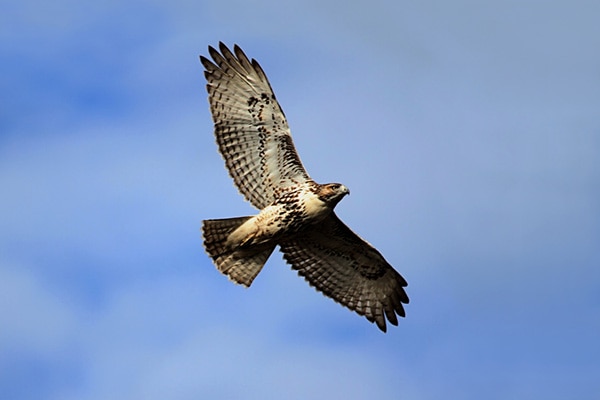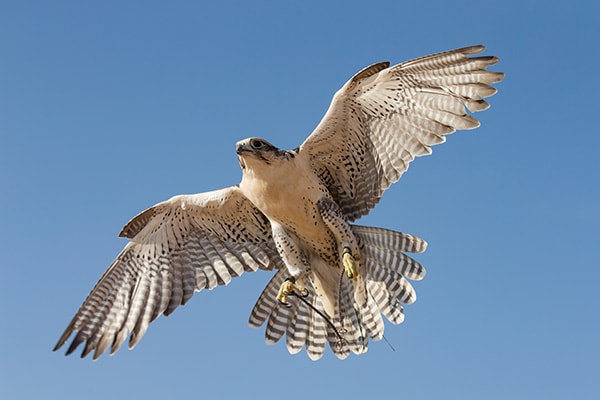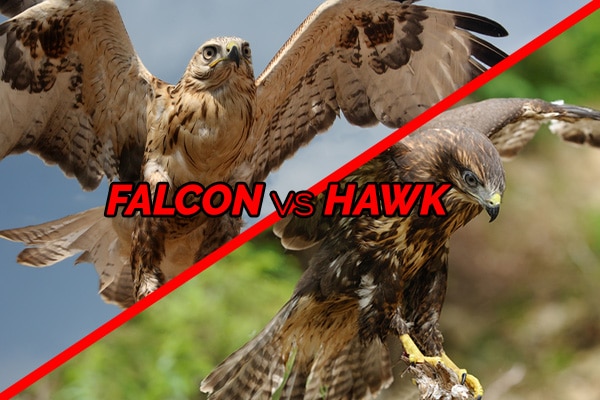Contents [show]
If you’re new to bird watching, telling the difference between some bird species can be challenging. For example, crows vs. ravens and hawks vs. falcons.
When you see a big bird flying in the sky with large hooked beaks, it will get you thinking: Is that a hawk or a falcon? As these are both birds of prey, they have many similarities, and you’ll only be able to tell the difference if you look closely at them.
In this article, we’ll discuss the main difference between hawks and falcons, in terms of their:
- Taxonomy
- Appearance
- Flight pattern
- Hunting Habit
- Diet
- Nesting
- Speed
- Other distinguishing factors
We’ll also share some exciting facts about these two birds. So, if you’re ready to finally identify which is which confidently, read on…
Hawks vs. Falcons: Taxonomy
Hawks

Hawks are birds of prey of the family Accipitridae. Despite belonging to one family, hawks are divided into two subfamilies – the forest hawks or the accipiters and the open country hawks or the buteos.
Some bird watchers also use the term true hawks to refer to the accipiters and buzzards for the buteonine hawks.
There are over 270 species of hawks, and among the most popular are:
- Red-tailed Hawk
- Sharp-shinned Hawk
- Goshawk
- Ferruginous Hawk
- Cooper’s Hawk
- Red-shouldered Hawk
And a whole lot more!
Falcons

Falcons are birds of prey in the family Falconidae. And while hawks belong in various genus, falcons belong in only one—the genus Falco.
There are only about 40 species, which means their numbers are a lot smaller than hawks. Some of the most famous falcons we know are:
- Peregrine Falcon
- Prairie Falcon
- American Kestrel
- Merin
- Lanner
- Gyrfalcon
These birds are known all over the world, mainly because of their speed.
Hawks vs. Falcons: Appearance
Next, let’s compare these two bird species in terms of appearance.
Size
The first thing you’ll notice is that hawks are larger than falcons. Generally, a fully grown hawk can grow between 18 to 26 inches and weighs between 0.7 to 1.6 kg. A falcon, on the other hand, can grow at a body length between 13 to 23 inches and weighs around 0.7 to 1.5 kg.
It’s a minimal difference and might be hard to notice. And there are also cases when some species of falcons are bigger than hawks.
So, if you can’t tell by their size, the next thing you can look at is their feather color.
Feather Color
Generally, hawks are seen with reddish-brown or dark brown heads and wings. They have a pale belly with striped white bands at the base. The wing’s underside is pale, and their long tail is darker than the rest of their body. Their feet and upper mouth are light-yellow in color, and their cheeks are brown.
Falcons, on the other hand, have dark grey to greyish blue heads, and the color extends to their backs. The wings are of the same color tone, only slightly lighter with a pale and white neck area. You’ll also find that their faces are generally white, and their bellies are striped down to the base.
Wing Shape
It’s also easy to tell a falcon from a hawk just based on the shape of its wings.
Falcon wings are generally longer and slender than hawks’, and the wingtips are pointed. Hawks, on the other hand, have shorter and broader wings, with their wingtips also finger-like.
This differentiation is much more reliable than just simply referring to the birds’ size or color.
Head and Beak Shape
The next thing you can look at is the shape of the bird’s head and beak.
The falcon’s head is short and rounded, while the hawk’s head is sleek and pointed. The beaks look similar, but if you look closely, the falcon’s beak has an angular curve while hawks have smoother beaks with a simple curve.
Hawks vs. Falcons: Flight Pattern
Apart from the wings, you can also tell the hawk from a falcon based on its flight pattern.
When the hawk or falcon is too high up in the air, and you can’t see the wingtips clearly, try to observe their flight pattern. When the bird flaps its wings faster and glides only for short periods, that’s a falcon. But if the bird glides more often and flaps slowly, that’s a hawk.
Hawks vs. Falcons: Speed
Not this one is easy.
Between the hawk and the falcon, the falcon is definitely faster. As we all know by now, falcons are well-known for their super-fast speed. They are generally faster than most birds, thanks to their thin, long wings and lightweight bodies.
One famous falcon when it comes to speed is the Peregrine Falcon. It is known to be one of the fastest animals on the planet and can dive at 200 mph speed.
Hawks are generally slower in terms of diving or just ordinary flying.
Hawks vs. Falcons: Hunting Habit
We should also look at the hunting habits of these birds. Although both are birds of prey, the way they hunt is different.
Falcons generally love hunting while being so high up in the sky. And because they have incredible eyesight, they can easily spot a try on the ground. When they do, they do something that we call a “stoop”, which is when they start diving downwards to catch their prey.
These birds use their talon claws to catch and hold their prey and take them somewhere before killing them with their claws.
Hawks, on the other hand, hunt while perching high above the ground, on fences, trees, electric poles, etc. When they spot prey, they dive down and grab the prey with their talons. But, unlike the Falcons, hawks crush their prey with their claws immediately rather than using their beaks.
Hawks vs. Falcons: Nesting
Hawks build their nests on branches of tall trees, usually in sites with strong winds and a large view of the landscape. If no trees are available, they might even build nests on other higher objects that meet the requirements, like billboard platforms or chimneys.
Falcons choose to build their nests on cliffs. Sometimes, they also stay in old nests left by other birds on trees. They don’t really build nests, so they rely on old nest materials, or they just simply make a shallow hollow in the ground or sand to serve as their nests.
Interesting Facts About Hawks
- Hawks often hunt at dawn when nocturnal animals are awake.
- These birds sometimes fight with each other in the air over food.
- They can hunt prey in the air or on the ground.
- Hawks mate for life.
- Hawk courtship to females sometimes lasts over 10 minutes.
- They have incredibly large nests of up to 3 feet wide, and they usually build it out of sticks.
- They have excellent eyesight and hearing, but their sense of smell is not that great.
- They can dive at speeds of up to 150 mph.
- Female hawks are larger than males.
- The Ferruginous Hawk is the largest in North America.
- Northern Goshawk is the largest hawk species.
- Hawks can live up to 20 years in the wild.
- A flock of hawks is called a kettle of hawks, wherein a kettle contains thousands of birds.
- They can see colors, even colors that are in the ultraviolet range.
Interesting Facts About Falcons
- Falcons are super fast birds that can reach speeds of 242 mph.
- Humans have used these birds for hunting more than 3500 years ago.
- Falcons mate for life.
- They have incredible eyesight.
- Falcons nearly went extinct in North America due to the use of the pesticide DDT. Fortunately, by 1999, they were removed from the endangered species list.
- They can travel or migrate as much as 15,500 miles per year.
- Their greatest weapon is their beaks.
- They can live up to 20 years in the wild.
- The Gyrfalcon is the largest falcon species.
- Falcons can process four types of light, while humans can only process three.
Final Thoughts About The Difference Between Hawks and Falcons
And that’s how you can differentiate falcons from hawks!
As you can see, it’s not that hard. You just need to remember that hawks are generally bigger than falcons, while falcons have longer and slender wings. You’ll also notice that the wingtips of falcons are pointed while hawks are finger-like.
The heads and beaks shape is a great giveaway, too. The falcon’s head is rounder, and the hawk’s head is sleek and pointed. Falcon beaks are angularly curved, and hawks have smoother beaks with a simple curve.
When it comes to their flight pattern, falcons flap their wings faster and glide for short periods. In comparison, hawks glide more frequently and flap their wings slower.
May this guide be able to help you identify whether the raptor you found is a hawk or a falcon.

